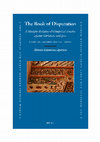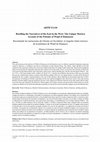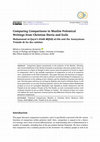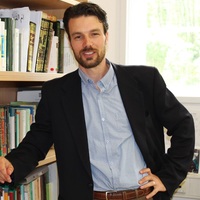Books by Mònica Colominas

While polemics and dialogue between Judaism and Christianity are as old as the Christian religion... more While polemics and dialogue between Judaism and Christianity are as old as the Christian religion itself, different periods, trends and intensities in the relations between the faiths can be distinguished clearly. A significant landmark in this long and complex history is the Christian engagement with Rabbinic Judaism which, during the thirteenth century, led to the Latin translation of large sections of the Talmud, the most important Jewish post-biblical text. The contributors to this volume explore Christian attitudes towards the Talmud from the Talmud trial in Paris in 1240 up to the time of the Disputation of Tortosa from 1412-1414, covering authors such as Ramon Martí, Nicholas of Lyra, Abner of Burgos and Jerónimo of Santa Fe. The case studies featured shed new light on the Latin translation of the Talmud, its condemnation as an allegedly heretical work, but also on the significance of Rabbinic Judaism for Christian apologetics.
Table of contents:
Alexander Fidora/Matthias Lutz-Bachmann: Christian Readings of Rabbinic Sources: Preliminary Considerations - Ursula Ragacs: Lost in Translation? Example(s) from Paris 1240 and Beyond - Isaac Lampurlanés Farré: The Papal Correspondence in the Latin Talmud Dossier - Moisés Orfali: Examples of Christian Misunderstanding of Anthropomorphic Rabbinic Texts - Chaim Hames: Barcelona 1263: Friar Paul's Reported Use of Rabbinic Sources - Wilhelm Schmidt-Biggemann: Raimundus Martini as an Anti-Jewish Polemicist - Thomas E. Burman: Ramon Martí, Nicholas of Lyra, Is. 48:16, and the Extended Literal Sense of Scripture - Görge K. Hasselhoff: Ramon Martí, Moshe ha-Darshan, and the Midrash Bereshit Rabbah - Diana Di Segni: The Victoria Porcheti adversus impios Hebraeos: Its Sources and Reception - Ryan Szpiech: One Messiah or Two? The Messiah ben Joseph in Medieval Jewish-Christian Debate - Alexander Fidora: Thomas Bradwardine and His Rabbinic Sources - Yosi Yisraeli: Debating the »School of Elijah« at Tortosa: The Making of a Christian Apocryphon? - Mònica Colominas Aparicio: Rabbis as Agents of Knowledge in Medieval Muslim Polemics: The Case of Ibn Qayyim al-Jawziyya's Hidāyat al-ḥayārā (Guidance for the Confused)

The Book of Disputation: A Mudejar Religious-Philosophical Treatise against Christians and Jews, 2024
This is the first critical edition and study of a unique and important Muslim polemic against Chr... more This is the first critical edition and study of a unique and important Muslim polemic against Christians and Jews. The Book of Disputation was written in Arabic by a Mudejar (subject Muslim living under Christian rule in late medieval Iberia) and offers new insight into the cultural and intellectual life of this Muslim minority. The text advances arguments drawn from natural philosophy—largely from Aristotle and Averroes—along with more traditional revealed sources such as the Qurʾān and the Bible.
Mudejar communities suffered a diminution of religious and political intelligentsia over time. This text, however, highlights the author's particular conception of the world as the creation of God in his defense of Islam, demonstrates the vitality of intellectual life among Muslims in medieval Christian Iberia, and documents the continued cultivation of natural philosophy within these Muslim communities.
https://brill.com/display/title/70056
The Religious Polemics of the Muslims of Late Medieval Christian Iberia examines the corpus of po... more The Religious Polemics of the Muslims of Late Medieval Christian Iberia examines the corpus of polemical literature against the Christians and the Jews of the protected Muslims (Mudejars). Commonly portrayed as communities in cultural and religious decay, Mònica Colominas convincingly proves that the discourses against the Christians and the Jews in Mudejar treatises provided authoritative frameworks of Islamic normativity which helped to legitimize the residence of their communities in the Christian territories. Colominas argues that, while the primary aim of the polemics was to refute the views of their religious opponents, Mudejar treatises were also a tool used to advance Islamic knowledge and to strengthen the government and social cohesion of their communities.
The American Historical Review, Volume 127, Issue 4, December 2022, pp. 2034–2035., 2022
For the published review, please see:
https://doi.org/10.1093/ahr/rhac449

Speculum 95, No. 2 (2020): 534-536, 2020
itself in muted fact, how these four poems serve as "witnesses to the Black Death and its recurre... more itself in muted fact, how these four poems serve as "witnesses to the Black Death and its recurrences" (22). Coley's chapter 1, on Cleanness, presents ways poetry can "recall events too painful to remember" and how it "embodies the strategies by which survivors struggle to remember the impact of past trauma" (55). Chapter 2, on Pearl, considers spots and blemishes, crucifixion images, and other figures of corruption that intensify tension between mortality and salvation and focus on human weakness and drede, a fear that comes from weakness-a facet also of cultural trauma. Part 2 begins with a chapter on Patience and how its reluctant protagonist, Jonah, marks "alternating episodes of flight and enclosure" (94): metaphorically the fear of death and hope for resurrection. A duty-bound priest might travel nominally under God's protection (the belly of the whale) into a community of seething disease. Sir Gawain and the Green Knight, "a poem steeped in misogyny and. .. dubious connections between women's bodies and epidemic disease" (164), the subject of chapter 4, suggests a "royal court becoming increasingly alienated from traditional seigneurial modes of chivalry and a conservative and insecure provincial gentry" (127). It mirrors the "ongoing demographic shift precipitated by the Black Death" (128). Ideas of government, economics, and even gender had to shift to accommodate the population's poly-decimation. The literary result, a "pestilence whispered" (167), allows only "sporadic references" to the plague. It also suggests a public saturated with sorrow and death. The poet dealt with disaster through suggestive and allusive imagery, hints of social catastrophe. The title of the book makes grim if playful reference to both Schubert's string quartet Death and the Maiden and Ariel Dorfman's play of the same name, which uses that music in an especially gruesome way. Music and play consider the interweaving tensions of life and death, innocence and guilt, passions enforced on the misfortunate by powerful persons or even by "nature red in tooth and claw." Now we can look back on the Black Death and understand it not as the scourge of God but as a disease that spread like oil-fed fire because it found the right vectors in the right populations. To the Pearl poet it would have seemed an Apocalypse beyond what we have seen so far from Ebola and may fear from COVID-19, nuclear weapons, international "police actions," and global climate change. Our governments, still caught up in age-old greed, racism, sexism, and the arrogance of personal privilege, fail to remediate our nascent plagues, even refusing to admit them into public discourse. Readers may find similar resonances of cultural criticism in such books as Byron Grigsby's Pestilence in Medieval and Early Modern English Literature (2004) for its interest in medieval assumptions about the relationship between disease and morality, Sianne Ngai's Ugly Feelings (2005) for its attention to cultural, critical, and literary affective blind spots, Lauren Berlant's Cruel Optimism (2011) for its unpacking of suffering related to pervasive unachievable fantasies, and even Michel Foucault's The Order of Things (1973) for its treatment of how our intellectual constructs of what we observe affect our art and science. Like Barbara Tuchman's A Distant Mirror (1978), Coley's well-researched book urges us to sort out what's quiet in the chaos amidst our own clear and present danger.
Bulletin of the School of Oriental and African Studies 82, No. 1 (2019): 181-183, 2019
Articles Refereed by Mònica Colominas

al-Qanṭara: Revista de Estudios árabes, 2024
Open Access: https://al-qantara.revistas.csic.es/index.php/al-qantara/article/download/808/866?in... more Open Access: https://al-qantara.revistas.csic.es/index.php/al-qantara/article/download/808/866?inline=1
This article discusses the polemics of Wāṣil of Damascus at the Byzantine court in a hitherto unstudied Aljamiado manuscript copied by Moriscos, or Muslims converted to Christianity in Early Modern Iberia. This debate, which unfolded in the first centuries of the expansion of Islam, has so far been studied on the basis of a single Arabic manuscript. The present contribution adds to the discussion the Aljamiado materials and a number of relevant Arabic sources. It reassesses the character of Wāṣil, his involvement in Byzantine politics and iconoclastic controversies, and his identification with the early theologian Wāṣil b. ʿAṭāʾ (d. 2nd/8th c.). The historical data in Ibn ʿAsākir’s Taʾrīḫ (6th/12th c.) and the role of Wāṣil as the true hero of the story also justify the need for a detailed and extensive analysis of the Muslim readings of the text. The unique Morisco account will be discussed alongside the new evidence, paying attention to the uses of this narrative and its adaptation in the passage from East to West. The practices of retelling tie with the examination of how the original triumphalist story and the key issues of the early Eastern Muslim-Christian debates acquired meaning in the face of the expansion of Iberian Christian society that ended with the expulsion of the Jews and, ultimately, the Moriscos. Taken together, the evidence attests to the preservation of this polemics over the centuries in Muslim circles and its dissemination sometimes in contexts far removed from the original, such as the Muslim West.
In Actas XV Simposio Internacional de Mudejarismo. Unidad y diversidad en las culturas mudéjar y morisca (Homenaje a Gonzalo M. Borrás Gualis), 2023
Hamsa: Journal of Judaic and Islamic Studies 9 (2023) (Dossier em Honra à Professora Filomena Barros), 2023
https://journals.openedition.org//hamsa/4193
This contribution analyzes comparative studies on J... more https://journals.openedition.org//hamsa/4193
This contribution analyzes comparative studies on Jews and Muslims, particularly in the Iberian Peninsula, being the relationship between these communities and their histories a topic that has aroused great interest in recent years. We focus on recent studies of their groups as minorities which take a clear comparative perspective, base their analysis on historical data and contribute to the formation of theory and methodology. The period covers approximately 1989 to 2022, with special attention to the last decade and includes publications by scholars from different disciplines and specializations, among them the academic honored here, Maria Filomena Lopes de Barros.
Religions 12 (11), 946, 2021
(This article belongs to the Special Issue Divine Logos in Translation: Philosophy and Biblical-E... more (This article belongs to the Special Issue Divine Logos in Translation: Philosophy and Biblical-Exegesis in Context) Academic Editors: Yossef Schwartz, Menachem Fisch and Christian Wiese
https://doi.org/10.3390/rel12110946 (registering DOI)

Translating Sacred Texts in Medieval and Early Modern Iberia, 2020
Translating Inspired Language, Transforming Sacred Texts: An Introduction
Author: Fatma Sinem Ery... more Translating Inspired Language, Transforming Sacred Texts: An Introduction
Author: Fatma Sinem Eryılmaz
The Old Testament in Translated Patristic Works: Ezekiel 1–4:3 and 40:1–47 in Fr. Gonzalo de Ocaña’s (1442) Spanish Translation of Homiliarum in Ezechielem Prophetam libri duo by Pope Gregory I
Author: Gemma Avenoza
Bible Translation by Jews and Christians in Medieval Catalan-Speaking Territories
Author: Pere Casanellas
Canonical and Non-Canonical Sources for Biblical History in Two Arabic Universal Histories Written by Christians in al-Andalus
Author: Mayte Penelas
Translation and Polemics in the Anti-Jewish Literature of the Muslims of Christian Iberia: The “Conversion of Kaʿb al-Aḥbār” or the “Lines of the Torah”
Author: Mònica Colominas Aparicio
Late Medieval Translations of the Qurʾān (1450–1525): Discontinuity or Cumulativeness?
Author: Benoît Grévin
Medieval Encounters 26: pp. 443–476, 2020

Entangled Religions 11, Nr. 4 (Behaving Like Heathens. Polemical Comparisons and Pre-Modern Discourses of Religious Diversity from an Interdisciplinary Perspective), 2020
Comparison figures prominently in the polemics of the Muslim, Christian, and Jewish inhabitants o... more Comparison figures prominently in the polemics of the Muslim, Christian, and Jewish inhabitants of the Iberian Peninsula in premodern and early modern times. Its pervasiveness as a figure of thought in their sources raises the question of variety in regard to comparison-that is, the multiple expressions of comparison as well as its numerous uses-particularly in the field of polemics. This paper discusses the functions of comparison in polemics as a necessary first step to advance current knowledge of comparison as a historical practice in the making of one's identity and the definition of groups and individuals. The discussion will focus on writings by Muslims who lived in Christian Iberia. It will focus particularly on two anti-Christian polemics: that by the Tunisian author Muḥammad al-Qaysī in an as-yet unstudied Aljamiado copy (Spanish in Arabic characters); and the Tratado de los dos caminos (Treatise of the Two Roads), an early seventeenth-century work of Islamic doctrine by the so-called "Refugee in Tunisia". The analysis of these two works will address the most important common points and differences between their respective polemical comparisons.
al-Qantara: Revista de Estudios Árabes 41, Nr. 1 (2020), pp. 95–147, 2020
Un eslabón árabe perdido de la literatura aljamiada: reuniones musulmanas (maŷālis) y la circulac... more Un eslabón árabe perdido de la literatura aljamiada: reuniones musulmanas (maŷālis) y la circulación de escritos andalusíes y mašriqíes entre los mudéjares y los moriscos (MS Árabe 1668, Biblioteca Real de El Escorial, Madrid)
Hamsa: Journal of Judaic and Islamic Studies 6 (2019-April 2020), 2019
Este artigo argumenta que, o até agora desconhecido manuscrito português "Profesias dadas por um ... more Este artigo argumenta que, o até agora desconhecido manuscrito português "Profesias dadas por um Mouro de Granada" (copiado no séc. XVIII), deve ser visto como um exemplo da imaginação profética messiânico-política no Portugal e na Espanha moderna. A nossa discussão focar-se-á nos usos políticos do Sebastianismo em Portugal e nas variadas formas pelas quais a linguagem profética se enreda nos discursos proféticos mais amplos nos territórios ibéricos, que resultam dos séculos das lutas militares e religiosas com o Islão e os Muçulmanos.
Intellectual History of the Islamicate World, 2019
https://brill.com/view/journals/ihiw/ihiw-overview.xml
Medieval Encounters, 2018
El presente artículo examina las aportaciones recientes al estudio del islam y de las comunidades... more El presente artículo examina las aportaciones recientes al estudio del islam y de las comunidades de musulmanes de Castilla en la edad medieval y moderna temprana (2000)(2001)(2002)(2003)(2004)(2005)(2006)(2007)(2008)(2009)(2010)(2011)(2012)(2013)(2014). Nuestro objetivo es identificar las principales áreas de interés, los temas y las cuestiones clave abordadas por los especialistas en este campo, así como valorar la importancia de las nuevas aportaciones al conjunto existente de conocimiento de las fuentes islámicas y de la práctica del islam en Castilla. Se argumentará que las aportaciones recientes en este ámbito * Fecha de recepción del artículo: 2015-05-26. Comunicación de evaluación al autor: 2015-6-22. ponen al descubierto las ricas posibilidades que ofrecen para un acercamiento innovador e interdisciplinario al islam en tanto que religión vivida en minoría.
This is a digital offprint for restricted use only | © 2014 Koninklijke Brill NV CONTENTS











Uploads
Books by Mònica Colominas
Table of contents:
Alexander Fidora/Matthias Lutz-Bachmann: Christian Readings of Rabbinic Sources: Preliminary Considerations - Ursula Ragacs: Lost in Translation? Example(s) from Paris 1240 and Beyond - Isaac Lampurlanés Farré: The Papal Correspondence in the Latin Talmud Dossier - Moisés Orfali: Examples of Christian Misunderstanding of Anthropomorphic Rabbinic Texts - Chaim Hames: Barcelona 1263: Friar Paul's Reported Use of Rabbinic Sources - Wilhelm Schmidt-Biggemann: Raimundus Martini as an Anti-Jewish Polemicist - Thomas E. Burman: Ramon Martí, Nicholas of Lyra, Is. 48:16, and the Extended Literal Sense of Scripture - Görge K. Hasselhoff: Ramon Martí, Moshe ha-Darshan, and the Midrash Bereshit Rabbah - Diana Di Segni: The Victoria Porcheti adversus impios Hebraeos: Its Sources and Reception - Ryan Szpiech: One Messiah or Two? The Messiah ben Joseph in Medieval Jewish-Christian Debate - Alexander Fidora: Thomas Bradwardine and His Rabbinic Sources - Yosi Yisraeli: Debating the »School of Elijah« at Tortosa: The Making of a Christian Apocryphon? - Mònica Colominas Aparicio: Rabbis as Agents of Knowledge in Medieval Muslim Polemics: The Case of Ibn Qayyim al-Jawziyya's Hidāyat al-ḥayārā (Guidance for the Confused)
Mudejar communities suffered a diminution of religious and political intelligentsia over time. This text, however, highlights the author's particular conception of the world as the creation of God in his defense of Islam, demonstrates the vitality of intellectual life among Muslims in medieval Christian Iberia, and documents the continued cultivation of natural philosophy within these Muslim communities.
https://brill.com/display/title/70056
Articles Refereed by Mònica Colominas
This article discusses the polemics of Wāṣil of Damascus at the Byzantine court in a hitherto unstudied Aljamiado manuscript copied by Moriscos, or Muslims converted to Christianity in Early Modern Iberia. This debate, which unfolded in the first centuries of the expansion of Islam, has so far been studied on the basis of a single Arabic manuscript. The present contribution adds to the discussion the Aljamiado materials and a number of relevant Arabic sources. It reassesses the character of Wāṣil, his involvement in Byzantine politics and iconoclastic controversies, and his identification with the early theologian Wāṣil b. ʿAṭāʾ (d. 2nd/8th c.). The historical data in Ibn ʿAsākir’s Taʾrīḫ (6th/12th c.) and the role of Wāṣil as the true hero of the story also justify the need for a detailed and extensive analysis of the Muslim readings of the text. The unique Morisco account will be discussed alongside the new evidence, paying attention to the uses of this narrative and its adaptation in the passage from East to West. The practices of retelling tie with the examination of how the original triumphalist story and the key issues of the early Eastern Muslim-Christian debates acquired meaning in the face of the expansion of Iberian Christian society that ended with the expulsion of the Jews and, ultimately, the Moriscos. Taken together, the evidence attests to the preservation of this polemics over the centuries in Muslim circles and its dissemination sometimes in contexts far removed from the original, such as the Muslim West.
This contribution analyzes comparative studies on Jews and Muslims, particularly in the Iberian Peninsula, being the relationship between these communities and their histories a topic that has aroused great interest in recent years. We focus on recent studies of their groups as minorities which take a clear comparative perspective, base their analysis on historical data and contribute to the formation of theory and methodology. The period covers approximately 1989 to 2022, with special attention to the last decade and includes publications by scholars from different disciplines and specializations, among them the academic honored here, Maria Filomena Lopes de Barros.
https://doi.org/10.3390/rel12110946 (registering DOI)
Author: Fatma Sinem Eryılmaz
The Old Testament in Translated Patristic Works: Ezekiel 1–4:3 and 40:1–47 in Fr. Gonzalo de Ocaña’s (1442) Spanish Translation of Homiliarum in Ezechielem Prophetam libri duo by Pope Gregory I
Author: Gemma Avenoza
Bible Translation by Jews and Christians in Medieval Catalan-Speaking Territories
Author: Pere Casanellas
Canonical and Non-Canonical Sources for Biblical History in Two Arabic Universal Histories Written by Christians in al-Andalus
Author: Mayte Penelas
Translation and Polemics in the Anti-Jewish Literature of the Muslims of Christian Iberia: The “Conversion of Kaʿb al-Aḥbār” or the “Lines of the Torah”
Author: Mònica Colominas Aparicio
Late Medieval Translations of the Qurʾān (1450–1525): Discontinuity or Cumulativeness?
Author: Benoît Grévin
http://www.mediterraneanseminar.org/2023-april-article-of-the-month
Table of contents:
Alexander Fidora/Matthias Lutz-Bachmann: Christian Readings of Rabbinic Sources: Preliminary Considerations - Ursula Ragacs: Lost in Translation? Example(s) from Paris 1240 and Beyond - Isaac Lampurlanés Farré: The Papal Correspondence in the Latin Talmud Dossier - Moisés Orfali: Examples of Christian Misunderstanding of Anthropomorphic Rabbinic Texts - Chaim Hames: Barcelona 1263: Friar Paul's Reported Use of Rabbinic Sources - Wilhelm Schmidt-Biggemann: Raimundus Martini as an Anti-Jewish Polemicist - Thomas E. Burman: Ramon Martí, Nicholas of Lyra, Is. 48:16, and the Extended Literal Sense of Scripture - Görge K. Hasselhoff: Ramon Martí, Moshe ha-Darshan, and the Midrash Bereshit Rabbah - Diana Di Segni: The Victoria Porcheti adversus impios Hebraeos: Its Sources and Reception - Ryan Szpiech: One Messiah or Two? The Messiah ben Joseph in Medieval Jewish-Christian Debate - Alexander Fidora: Thomas Bradwardine and His Rabbinic Sources - Yosi Yisraeli: Debating the »School of Elijah« at Tortosa: The Making of a Christian Apocryphon? - Mònica Colominas Aparicio: Rabbis as Agents of Knowledge in Medieval Muslim Polemics: The Case of Ibn Qayyim al-Jawziyya's Hidāyat al-ḥayārā (Guidance for the Confused)
Mudejar communities suffered a diminution of religious and political intelligentsia over time. This text, however, highlights the author's particular conception of the world as the creation of God in his defense of Islam, demonstrates the vitality of intellectual life among Muslims in medieval Christian Iberia, and documents the continued cultivation of natural philosophy within these Muslim communities.
https://brill.com/display/title/70056
This article discusses the polemics of Wāṣil of Damascus at the Byzantine court in a hitherto unstudied Aljamiado manuscript copied by Moriscos, or Muslims converted to Christianity in Early Modern Iberia. This debate, which unfolded in the first centuries of the expansion of Islam, has so far been studied on the basis of a single Arabic manuscript. The present contribution adds to the discussion the Aljamiado materials and a number of relevant Arabic sources. It reassesses the character of Wāṣil, his involvement in Byzantine politics and iconoclastic controversies, and his identification with the early theologian Wāṣil b. ʿAṭāʾ (d. 2nd/8th c.). The historical data in Ibn ʿAsākir’s Taʾrīḫ (6th/12th c.) and the role of Wāṣil as the true hero of the story also justify the need for a detailed and extensive analysis of the Muslim readings of the text. The unique Morisco account will be discussed alongside the new evidence, paying attention to the uses of this narrative and its adaptation in the passage from East to West. The practices of retelling tie with the examination of how the original triumphalist story and the key issues of the early Eastern Muslim-Christian debates acquired meaning in the face of the expansion of Iberian Christian society that ended with the expulsion of the Jews and, ultimately, the Moriscos. Taken together, the evidence attests to the preservation of this polemics over the centuries in Muslim circles and its dissemination sometimes in contexts far removed from the original, such as the Muslim West.
This contribution analyzes comparative studies on Jews and Muslims, particularly in the Iberian Peninsula, being the relationship between these communities and their histories a topic that has aroused great interest in recent years. We focus on recent studies of their groups as minorities which take a clear comparative perspective, base their analysis on historical data and contribute to the formation of theory and methodology. The period covers approximately 1989 to 2022, with special attention to the last decade and includes publications by scholars from different disciplines and specializations, among them the academic honored here, Maria Filomena Lopes de Barros.
https://doi.org/10.3390/rel12110946 (registering DOI)
Author: Fatma Sinem Eryılmaz
The Old Testament in Translated Patristic Works: Ezekiel 1–4:3 and 40:1–47 in Fr. Gonzalo de Ocaña’s (1442) Spanish Translation of Homiliarum in Ezechielem Prophetam libri duo by Pope Gregory I
Author: Gemma Avenoza
Bible Translation by Jews and Christians in Medieval Catalan-Speaking Territories
Author: Pere Casanellas
Canonical and Non-Canonical Sources for Biblical History in Two Arabic Universal Histories Written by Christians in al-Andalus
Author: Mayte Penelas
Translation and Polemics in the Anti-Jewish Literature of the Muslims of Christian Iberia: The “Conversion of Kaʿb al-Aḥbār” or the “Lines of the Torah”
Author: Mònica Colominas Aparicio
Late Medieval Translations of the Qurʾān (1450–1525): Discontinuity or Cumulativeness?
Author: Benoît Grévin
http://www.mediterraneanseminar.org/2023-april-article-of-the-month
List of Illustrations
Acknowledgments
Introduction
Part I The Medieval Iberian World
1. “‘When I Argue with Them in Hebrew and Aramaic’: Tathlīth al-waḥdānīyah,
Ramon Martí, and Proofs of Jesus’s Messiahship,” Thomas E. Burman
2. “Qurʾānic Quotations in Latin: Translation, Tradition, and Fiction in Polemical Literature,” Antoni Biosca i Bas and Óscar de la Cruz
3. “The Mudejar Polemic Ta’yīd al-Milla and Conversion between Islam and Judaism in the Christian Territories of the Iberian Peninsula,” Mònica Colominas Aparicio
4. “‘Sermo ad conversos, christianos et sarracenos’: Polemical and Rhetorical Strategies in the Sermons of Vincent Ferrer to Mixed Audiences of Christians and Muslims,” Linda G. Jones
Part II Around the Forced Conversions
5. “Jewish Anti-Christian Polemics in Light of Mass Conversion to Christianity,” Daniel J. Lasker
6. “Theology of the Laws and Anti-Judaizing Polemics in Hernando de Talavera’s Católica impugnación,”Davide Scotto
7. “The Double Polemic of Martín de Figuerola’s Lumbre de fe contra el Alcorán,” Mercedes García-Arenal
8. “Art of Conversion? The Visual Policies of the Jesuits, Dominicans, and Mercedarians in Valencia,” Borja Franco Llopis
9. “Marcos Dobelio’s Polemics against the Authenticity of the Granadan Lead Books in Light of the Original Arabic Sources,” Pieter Sjoerd van Koningsveld and Gerard Wiegers
Part III Mediterranean and European Transfers
10. “Prisons and Polemics: Captivity, Confinement, and Medieval Interreligious Encounter,” Ryan Szpiech
11. “The Libre de bons amonestaments by ‘Abd Allāh al-Tarjumān: A Guidebook for Old and New Christians,” John Dagenais
12. “Poetics and Polemics: Ibrahim Taybili’s Anti-Christian Polemical Treatise in Verse,” Teresa Soto
13. “Torah Alone: Protestantism as Model and Target of Sephardi Religious Polemics in the Early Modern Netherlands,” Carsten Wilke
Notes on Contributors
Bibliography
Index
- Introducción
- 1. El Nuevo Mundo y las inquietudes apocalípticas en el siglo XVI italiano //Adriano Prosperi
- 2. Profecía, conversión y polémica islamo-cristiana en la Iberia alto-moderna (siglo XV): Alfonso de Jaén y el círculo del obispo don Martín García // Mònica Colominas Aparicio
- 3. Migraciones y expectativas mesiánicas. Giorgio Benigno Salviati, el monje Teodoro y Paolo Angelo en la Italia del Renacimiento //Michele Lodone
- 4. Profetizar la reforma. Paolo Angelo y el Apocalypsis Nova // Eduardo Fernández Guerrero
- 5. Pedro González de Mendoza, de Toledo a Roma. El patronazgo de Santa Croce in Gerusalemme entre la arqueología y la filología // Felipe Pereda
- 6. Sebastiano del Piombo y las fuentes de la Capilla Borgherini: Pietro Galatino, Egidio da Viterbo y el Apocalypsis Nova // Stefania Pasti
- 7. Nemo crucis titulos tam convenienter habebat quam tu. Entre profecía y devoción: símbolos e imágenes en el programa religioso y político de Bernardino López de Carvajal // Edoardo Rossetti
- 8. Las revelaciones de Arcangela Panigarola: entre profetismo y devoción // Corinna T. Gallori
- 9. La Imago Pietatis de Santa Croce in Gerusalemme, el papa Gregorio Magno y España // Jack Freiberg
- 10. El mito de las Tribus Perdidas entre España, Europa y el Nuevo Mundo // Marco Volpato
- 11. Campanella y el Islam // Michele Olivari
- Bibliografía
- Índice
https://hcommons.org/deposits/item/hc:34537/
Mustafa Binmaya's English original can also be found in this anthology.
https://brill.com/view/journals/jal/54/3-4/article-p460_15.xml?ebody=previewpdf-68011
KEYNOTE LECTURE: Tobias Nicklas, “Redefining the Space: Redefining the Self and the Other in the Apocryphal Acts of the Apostles”
Jacques van Ruiten, “Religious Diversity and the Book of Jubilees”
Arjen Bakker, “ICitizens of the Cosmos: The Annual Celebration of the Septuagint Translation on the Island of Pharos“
Mladen Popovic, “‘Some of the Works of the Law’ and the Social Context of Writing: Copying 4QMMT as Public Display of Identity?”
Ayhan Aksu, “Ancient Representations of Ancient Kings: The Case of Sargon of Akkad”
Susanne Luther, “The Authenticity of John’s Story: The Construction of a Literary Identity in Early Christianity”
Lautaro Roig Lanzillotta (Groningen), “Public Displays of Religious Identity in the so-called Sethian Treatises of Nag Hammadi? An Analysis of their Anthropological Framework”
Ahmad Al-Jallad, “Expressions of Religious Identity in Pre-Islamic and Early Islamic Graffiti from Arabia”
May Shaddel, “Kaaba Triumphant: Revisiting the Early History of Islam’s Holy Sanctuary, ca. 600-800 CE”
Kati Ihnat, “Martyrs and the Construction of Christian Identity in Early Medieval Iberia”
Ana Echevarría and Irene Pereira, “The Public Expression of Death: Christians in al-Andalus, 9th-12th c.”
Gerard Wiegers and Mònica Colominas Aparicio, “Ritual and Public Expressions of Islam in Iberia”
Religious minorities are a key element for the writing of the history of the medieval Iberian Peninsula, not only of the Christian territories but also of those under Muslim rule known as al-Andalus. These are communities to which scholarship has sometimes paid less attention or for which we have less evidence in the sources. For example, the data of tributary Christians in the period of splendor of the Nasrid Muslim kingdom of Granada, in the fourteenth century, is scarce. Yet the picture changes somewhat if we take into consideration a wider range of identities at the time and a theoretical perspective that stops at particularly sources that are useful to understand the practices of the communities. In this presentation I will ta-ke one of these sources to briefly discuss two elements of importance for intergroup relations at the time: mixed marriages and conversion.
Wednesday 24 August 2022
11.15- 13.00 The manuscript culture of Iberian Muslims – Arabic Aljamiado and Spanish (VIII-XVII century), Mònica Colominas Aparicio
Seminar instructors: Dr Mònica Colominas Aparicio and Dr Helge Wendt
Mondays, 09:00 a.m.-12:15 p.m. Credits: 8 ECTS, 4 U.S. credits
Office Hours: Mondays, 12:30-13:30 (room 98a.0.09 (Platanenstraße 98a) or by appointment
Over the course of two weeks, specialists from Leiden University and beyond will provide theoretical instruction on issues of editing, paleography, conservation and other material aspects of oriental manuscripts. They will also speak about philology, literacy and orality and the transmission of knowledge in the Islamic manuscript culture, presenting case-studies from various parts of the Muslim world. Participants can use this information to practice their skills in producing a sample critical edition of a manuscript of their choice, under the supervision of experts.
Since the first contributions of scholars such as Scaliger, Golius and Warner, the Leiden University Library has housed one of the most important collections of oriental manuscripts in Europe. It includes thousands of Arabic, Persian and Ottoman manuscripts, not only from the historic heartlands of Islam but also from Asia, al-Andalus and Africa. Each participant will have full access to this collection as well as other library services.
Practical information
Language of instruction: English. Non-native speakers are required to have a command of English equivalent to at least TOEFL 550.
Costs: €750,- (including access to the library). Participants are expected to provide for their own travel, visa (if applicable), accommodation and living expenses. LUCIS will provide invitation letters for participants who need to apply for a visa.
Reduced fee: Participants who are unable to secure financial support from their home institution may be eligible for reduced fees. Please contact LUCIS at lucis@hum.leidenuniv.nl for more information about the possibility of a reduced fee.
Application
Graduate (MA and PhD) students and researchers who have an interest in handwritten materials and text editing are encouraged to apply for participation in the summer school. Applications should include:
A letter of motivation specifying what research language(s) the applicant masters;
A curriculum vitae;
If you are a non-native speaker of English: a certificate testifying command of the English language (TOEFL 550 or equivalent).
The deadline for applications is Monday 20 June, 2019. Participants will be informed about their application by Friday 28 June, 2019. Send your application to lucis@hum.leidenuniv.nl.
https://podcasts.apple.com/us/podcast/monica-colominas-aparicio-muslim-understandings-sephardic/id1079443054?i=1000439156850
https://player.fm/series/frankely-judaic-explorations-in-jewish-studies/monica-colominas-aparicio-muslim-understandings-of-sephardic-exceptionalism-in-christian-iberia
Título: Libros sobre los moriscos.
Conferenciantes:
Dr. Seth Kimmel (Universidad de Columbia, USA).
Dr. Mayte Green-Mercado (Universidad de Rutgers, USA).
Dr. Borja Franco Llopis (Universidad Nacional de Educación a Distancia, España).
Dr. Mònica Colominas Aparicio (Universidad de Groninga, Países Bajos).
Dr. Mohamed Saadan Saadan (Universidad Mohammed V, Marruecos).
Fecha: 22 de junio de 2021, a las 17:00 en Túnez (+01 GMT)
Esta serie de seminarios en línea titulados: “Moriscos sin fronteras” tienen como objetivo estudiar la cuestión morisca desde diferentes puntos de vista, a través los diversos temas que vamos a tratar, o los investigadores que van a presentar sus trabajos, especialistas – como se refiere el título de nuestro seminario- son de todo el mundo, y tienen varias especialidades y aproximaciones.
Organizador: Laboratoire Régions et Ressources patrimoniales de Tunisie-LR99ES23 (Universidad de la Manouba)
Coordinador: Dr. Houssem Eddine Chachia
NB: La charla va a ser en español, pero las cuestiones se pueden ser en inglés, francés o árabe.
Enlace de registro: https://us02web.zoom.us/meeting/register/tZUoc-Gqpj4pHtJId1U0wrvxx8o6CeaOZ05D